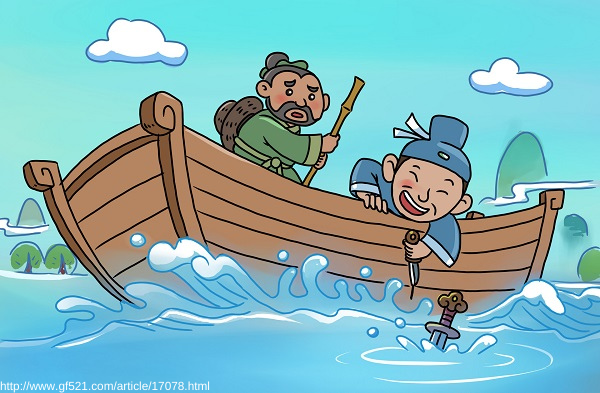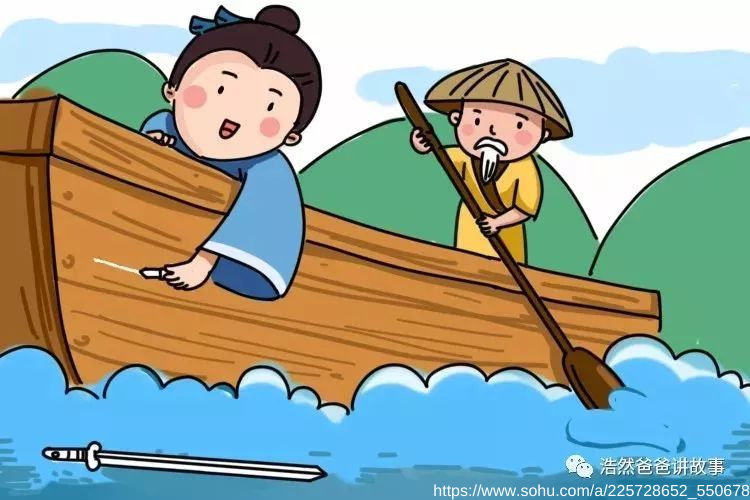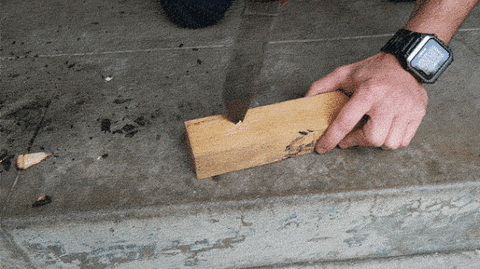Chinese Idiom Explained: 刻舟求剑
August 26, 2022
The popular Chinese idiom “刻舟求剑” (kè zhōu qiú jiàn) can be roughly translated as "being stuck in your ways” in English.
In this blog, we will share with you both the Chinese and the English versions of the story behind the idiom “刻舟求剑” (kè zhōu qiú jiàn), what it means, as well as how to use it in a sentence.
Let’s dive in!

从前有个楚国人,他特别喜爱自己的宝剑,无论走到哪儿,他都带着它。一天他坐船过江,船到了江中心的时候,他的剑突然从船上滑到了水里!他想抓住,可是已经来不及了!船上的人都很着急,大声催他:“快下水去找剑啊!”
Long ago, there was a man from the state of Chu who adored his sword. He took it with them everywhere he went. One day, he was crossing the river on a ferry. Towards the middle of the crossing, he suddenly realized that his sword had slipped into the water! He wanted to grab it, but it was already too late! The others on the boat were frantically trying to help him, urging and shouting ‘Quick! Jump in and grab it!’
可是这个楚国人看上去一点儿也不着急,而是拿出一把小刀,在船舷上刻了一个印记,船上的人觉得很奇怪,问他:“你怎么不下水找剑?在这里刻什么?”
But this man was not panicked at all. He simply pulled out a small knife and made a little mark on the boat. The others on the ferry thought this was very strange and asked him: ‘Why aren’t you going into the water and finding your sword? What did you carve a mark onto the boat?’
他指着自己在船上刻的记号,很有信心地说:“不用担心,这是我的剑掉下去的地方,等船靠岸了,我再从这里下去找。”
He pointed to the mark he made on the ferry and said confidently: ‘Don’t worry, this is where I lost my sword. When I’m back on shore, I’ll start looking from here.’

船越走越远,很快离开了刚才剑掉下去的地方。一个小时后,船终于到达了岸边,停了下来。这时候,这个楚国人按照他在船上刻的记号,马上下水去找剑,可是他怎么能找得到呢?
As the ferry sailed away, it grew farther and farther away from where the sword fell. An hour later, the ferry finally arrived at the far bank of the river. Then, this man jumped into the water where his carving was and began looking for his sword. But how could he find it?
他在船下的水中找了好久好久,结果连剑的影子也没找到。
He searched for so long beneath the ferry, but his sword was nowhere to be found.

这个故事告诉我们如果不会根据实际情况灵活处理问题,那么注定会失败。
This idiom tells us that we are destined to fail if we stay rigid and don't look at problems realistically.
"刻舟求剑”就是用刀在船上刻个记号,便于找到宝剑。(但是,宝剑当然是找不到了!)所以这个成语比喻办事刻板,不会随着实际情况的变化而变通。
‘Carving a boat to find a sword’ means to carve a mark so that you can find the sword. (But of course, you’ll never find the sword that way!) So this idiom is a metaphor for when someone does things rigidly and refuses to change with the times.
如:情况已经发生了变化,“刻舟求剑”的做法只会成为我们前进的绊脚石。
For example, when situations change, to ‘carve a mark on a boat to find a sword’ will be the greatest roadblock.

刻 kè (to carve)

舟 zhōu (boat)

求 qiú (hope, find)

剑 jiàn (sword)

例句 (Example Sentences)
无论做什么,都要根据情况的变化随时调整方法,切不能“刻舟求剑”。
Wúlùn zuò shénme, dōu yào gēnjù qíngkuàng de biànhuà suíshí tiáozhěng fāngfǎ, qiè bùnéng “kèzhōuqiújiàn”.
No matter what you do, you have to adjust your plan according to the situation before you. You can’t carve a mark on a boat to find your sword.
时代在发展,我们绝不能“刻舟求剑”,用老的方法处理一切问题。
Shídài zài fāzhǎn, wǒmen jué bùnéng “kèzhōuqiújiàn”, yòng lǎo de fāngfǎ chǔlǐ yīqiè wèntí.
As the times change, we cannot be too stuck in our ways and solve all our problems using past methods.
About the Writer
Qi Laoshi
Tianjin Normal University; Chinese language textbook editor and a doting mother.

Want to learn more? We have more Chinese Idioms in store for you!